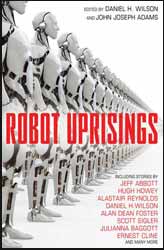|
Click here to return to the main site. Book Review
It seems appropriate, at a time when the UN is to debate whether arming robots should be banned, given that in some quarters enthusiastic military types are talking about producing robots that will make their own determination about just who should be killed, that an anthology which takes a look at robot Armageddon should be published. Robot Uprisings (472 Pages) is edited by Daniel H. Wilson and John Joseph Adams. The book contains seventeen short stories, which, while they all share the theme of robots becoming sentient and rebelling, the various rebellions are told from many point of view. Prophets of doom have existed from the first time Karel Čapek’s R.U.R., (1921) was performed, introducing the greater world to the word "robot", which became a popular image of technology running amok and turning on its creators. Of course not everybody felt that the creation of robots would be a bad thing. Isaac Asimov (1920 – 1992) wrote many robot stories, but even with his sympathetic view of our possible progeny, he felt the need to restrict robots with three laws, laws which have never been bettered meaning they will probably form a part of future AI’s. But let’s face it; tame robots are no fun at all, so we traverse our possible annihilation at the hands of our own creations in this new collection. The collection opens with a forward by Wilson, before we are presented with our first story, Complex God by Scott Sigler and with the growth of nano technology, this and other stories look at the possibility that our nemesis may not appear man shaped at all and because of their size might even pose a more credible threat. Other stories in the collection which posits a threat from smaller robots include Lullaby by Anna North, Nanonauts! In Battle with Tiny Death-Subs! by Ian McDonald and Daniel H. Wilson’s Small Things. Of course, not all threats have to be carried out as Cycles by Charles Yu proves as it takes us into the mind of a household robot, which has every reason to kill its owner, but doesn’t quite do it, remaining the unknown threat hiding in plain sight. If functional enough, rather than just a sex toy and convenient alarm clock, The Robot and the Baby, by John McCarthy wonders would we ever give the rearing of our children over to these machines and if we did Seanan McGuire’s We are all Misfit Toys in the Aftermath of the Velveteen War, wonders if the robots would ever relinquish the children. More traditional in its portrayal of a post-apocalyptic world, Eighty Mile an Hour all the way to Paradise by Genevieve Valantine, takes us on a road trip through hell. Executable by Hugh Howey is another along the same line, but this short story is really a pun. Human Intelligence by Jeff Abbott covers much the same ground, but provides its own little twist. Slightly out of left field comes The Omnibot Incident by Ernest Cline, which presents a non-uprising, concentrating on the thoughts and feelings of wonder and terror which the seemingly intelligent robot creates in its young owner. Alan Dean Foster produces a little gem of paranoia in Seasoning, a story about Bryden Erickson, who is convinced that AI intelligences are tainting human food chains. If we have battled through hoards of murderous man machines intent on our destruction, In Cory Doctorow’s story, Epoch we are asked to consider how we would feel about pulling the plug on the world’s only intelligent AI, just because it’s costing money and is not thought to be a sexy proposition or could we, like in Nnedi Okorafor’s Spider the Artist come to some form of understanding with our creations. Alastair Reynolds Sleepover, has a world where sentient AI, did not kill their creator, but transformed into higher beings, only to discover that the universe wasn’t what they thought it was. Of course, even if the robots win, what are the consequences for the victors, in The Golden Hour, Julianna Baggott feels that some sympathy for their creators may remain. If not sympathy, then Robin Wasserman’s Of Dying Heroes and Deathless Deeds takes us to the dark places inside a robot who loved his owners, but has spent too long slaughtering humans. One of the nice things about this collection is the myriad ways that the various authors have looked at our future relationship with robots, plus fourteen of the stories are original to this volume, so the greatest part of these stories are available nowhere else. Overall there is something for everybody here, a good collection of robot stories. 8 Charles Packer Buy this item online
|
|---|



